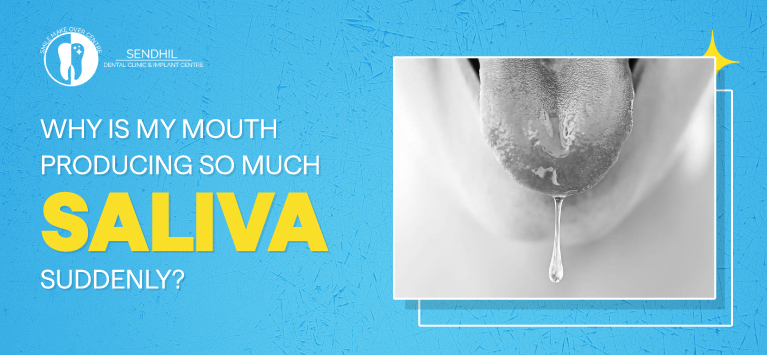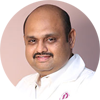
Why is my mouth producing so much saliva suddenly?
Saliva – The watery fluid secreted by glands inside the mouth keeps our mouths moist and lubricates the mouth to maintain the integrity of oral structures. Likely, saliva’s antimicrobial properties help block the growth of harmful microorganisms inside your mouth. The concentration of calcium and fluoride in saliva strengthens the enamel as well. Moreover, salivation inside your mouth helps break down food and helps in digestion.
In precise, saliva takes care of maintaining your oral cavity’s hard and soft tissues healthy.
When the salivary flow is lessened, you will encounter dryness in your mouth. On the other hand, various factors provoke excessive salivation. This condition is called hypersalivation.
What is meant by Hypersalivation?
Hypersalivation, also known as Sialorrhea, refers to the condition of our salivary glands producing more saliva. It can happen to anyone, regardless of age.
Even though it is harmless, it is linked to causes embarrassing side effects like drooling. Similarly, it provokes many discomforts as follows:
- Chapped lips
- Hard to sense the taste of foods
- Dehydration
- Speech problems
- Bad breath
- Softening and infection in the skin around the mouth
In certain circumstances, excessive saliva makes people inhale foods and fluids into their lungs. It will lead to pneumonia.
Hypersalivation is an indication of some dental dilemmas and bodily disorders. They weaken the mouth muscles, making it hard to control the saliva and leading to drooling. It means pinpointing and treating the underlying cause will fix this problem.
What causes Hypersalivation?
Various oral complications and health problems can weaken the mouth muscles, making it difficult to control saliva and causing drooling. Depending on the underlying illness. Hypersalivation can be either temporary or persistent. Here are the most common causes of excessive salivation and drooling.
Temporary Hypersalivation
- Infectious conditions
- Hormonal changes
- Cavities
- Toxic exposure
- Certain medications
Chronic Hypersalivation
- Aging
- Malocclusion
- Taking a lot of acidic foods and fluids
- Enlarged tongue
- Seasonal allergies
- Neurological diseases (Ex: Parkinson’s Disease, Amyotrophic lateral sclerosis)
- Muscle disorders (Ex: Cerebral Palsy, Facial Nerve Palsy)
- Some infectious conditions
Infectious conditions like strep throat, tonsillitis, and sinus infections promote saliva overproduction to fight the infection. When accompanied by weak muscles inside the mouth, an individual will salivate a lot.
For instance, aged persons and Parkinson’s disease sufferers have weak muscles inside their mouths. This is the reason behind they are drooling too much.
What are the Hypersalivation treatment options available?
As seen earlier, treating the underlying condition that triggers salivary glands to produce excessive saliva will fix hypersalivation. For instance, medications are essential to treat hypersalivation caused by allergic conditions.
Meanwhile, dentists would aid you in lessening the overproduction of saliva and drooling. Some of the dental treatments available to alleviate drooling are as follows:
- Oral devices – There are certain dental appliances to correct and ensure the jaw, lip, and tongue positions are correct. It implies that they keep their mouth closed and control drooling. However, it is not suitable for people with breathing problems and seizure disorders.
- Botox injection – It involves injecting botox directly into one of the salivary glands. It will numb the muscles and nerves in the region to produce saliva. Generally, the paralyzing effects of botox injection can last for 2 months only. Later, you should get injected again.
- Surgery – The surgical procedure is recommended in severe cases alone and involves removing or relocating a salivary gland to alleviate the overproduction of saliva and drooling.
- Radiation therapy –Radiation therapy is preferred when dentists find that surgical repair of salivary glands cannot be performed for a patient. As radiotherapy to the head and neck can impact salivary glands, it takes at least 6 months to secrete saliva.
Excessive salivation (or) Overproduction of saliva is not just a dental problem. It might be a warning sign of any infections progressing inside your body. So it is better to visit your dentist once you notice too much saliva in your mouth and encounter drooling suddenly. Your dentist will detect the root cause of this problem.
Frequently Asked Questions
What causes excessive saliva in the mouth?
Sometimes, too much spit can happen because of medicine, tummy problems, infections, or even when we eat certain foods. Stress, being pregnant, or allergies can also make us drool more for a little while.
How much spit up is normal for a newborn?
Babies often spit up a bit after eating, and it's normal as long as they're growing well, happy after feeding, and not in pain. But if they're spitting up a lot, seem uncomfortable, or not gaining weight, it's best to talk to a doctor.
What increases saliva production?
Several factors can boost saliva production, including:
- Eating: The act of eating or even thinking about food triggers saliva production.
- Spicy Foods: Spicy or sour foods can stimulate saliva flow.
- Nausea: When feeling queasy or nauseated, saliva production can increase.
- Pregnancy: Hormonal changes during pregnancy can lead to increased saliva.
- Allergies: Allergic reactions might prompt higher saliva production.
- Stress: Stress or anxiety can also cause the mouth to water more than usual.
When should i be worried about excess saliva?
If spit becomes too much and it's hard to eat or talk, or if it lasts a long time and makes it tough to swallow, it's a good idea to talk to a doctor.
What deficiency causes excess saliva?
There isn't a direct link between a specific deficiency and excess saliva. However, certain conditions like vitamin B12 deficiency or neurological issues might indirectly affect saliva production, potentially leading to changes in saliva quantity or consistency.



